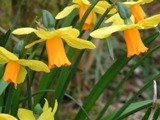
The season of Spring in the UK is generally thought to be during the months of March, April and May.
However, the ancient Celtic calendar states that Spring can begin early February and finish in early May.
In countries further south their Spring may be in different months. This is because countries like Australia have their warmer weather when we have our colder months.
Will your writing reflect the themes associated with an English Spring or take inspiration from other countries and cultures?
Spring is the season traditionally associated with celebrating the end of Winter and the new life that Spring brings.
You could write about how you feel about the Spring season. Are you glad to see the end of Winter? How do you feel when you see the first flowers appear? What are you favourite things about Spring? What things do you plan to do in the Easter holidays?

Spring brings warmer weather (hopefully!!!) and increased daylight hours (i.e. our days are lighter for longer). Although we have the term ‘April showers’ for a reason – in Cornwall we certainly get many rain showers in the Spring months!
You may like to write about Spring weather or base a story in this season.

During the Spring months new life is displayed wonderfully throughout nature.
In Spring we see: blossom, buds, daffodils, snowdrops, crocuses, tulips and green returning to trees and plants.
.
The natural world and animals provide many opportunities for writing. For example: you could write a poem about Spring flowers or a story about a rabbit’s adventures.

Food plays a central & essential part of our daily lives. There are various foods associated with Spring including: Chocolate eggs, decorated hard boiled eggs, Hot Cross Buns, Simnel cake, Spring vegetables (e.g. asparagus, broccoli) and Spring fruit (e.g. Rhubarb).

Although we have just had a monthly theme of food – perhaps you’d like to write something based on food associated with the Spring months. Example: a student who makes the largest chocolate Easter egg in the country.
Over the centuries people have celebrated Spring as the death of winter and have viewed it as the beginning of new life. This has been expressed through various rituals, celebrations and festivals.

There are various celebrations, festivals and events that occur in the Spring months. These include: Easter, Lent, Palm Sunday, Ascension, Good Friday, Maundy Thursday, April Fools, Mother’s Day, May Day, May pole dancing, Beltane, Spring Equinox, St David’s Day, St George’s Day, St Patrick’s Day.
.
There are also many festivals in Spring celebrated by various faiths including Buddhism, Sikh, Baha’i, Jewish and Hindu.

Perhaps you’d like to write about a Spring time celebration or event that you enjoy or have participated in. For example: maybe you participated in a St George’s day parade or gave your Mum an extra special Mother’s Day.
Maybe you’d like to research a Spring event that you’ve not experienced and write about what you’ve discovered. Example: you may like to research Celtic Spring celebrations.

Or write a story about someone attending a Spring celebration. For example: a story about a school who performs May pole dancing at their local May Day fair or a class that perform an Easter play.
When writing don’t forget to consider all five senses: sound, touch, sight, smell, taste. For example: the smell of daffodils and the taste of your chocolate Easter egg.
.
Email all your ‘Spring’ themed writing to bodminbookworm@aol.com . Please also visit the EXTRA page and comment on the book recommendations. If you have any inspiration, hints or tips on writing on the ‘Spring’ theme then please email bodminbookworm@aol.com and your ideas could be published on the HIT page.
Email all your ‘Spring’ themed writing to bodminbookworm@aol.com . Please also visit the EXTRA page and comment on the book recommendations. If you have any inspiration, hints or tips on writing on the ‘Spring’ theme then please email bodminbookworm@aol.com and your ideas could be published on the HIT page.
.
We look forward to reading your writing!













